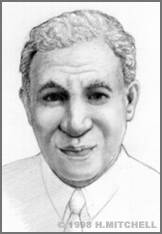Frederick Jones
Frederick McKinley Jones (1893-1961) applied the mechanical experience that he gained at work and at war to revolutionize two industries: cinema and refrigeration.
Born in Cincinnati, Jones learned mechanics and electronics from personal experience rather than from textbooks. After serving in France in World War I, he worked as a garage mechanic. Here he conceived the self-starting gas motor that he later patented in 1943.
In the 1920s, Jones moved to Minneapolis and began working for Joseph Numero, who sold equipment for the nascent movie industry. Jones invented a box-office device here that automatically distributed tickets and change to customers, which he patented in 1939. More importantly, he invented the first process that enabled movie projectors to play back recorded sound, making "talking pictures" possible.
Driving on a hot summer night in 1937, Jones resolved to invent air conditioning for cars and trucks. The potential benefit was not just passenger comfort. As Jones soon found out, truckers who transported meat and produce across the country were continually frustrated because the ice that they relied on would melt, causing the food to spoil.
Jones soon built a refrigeration unit for trucks, which was compact and shockproof, as well as automatic. It used Jones' self-starting motor, patented in 1949. Jones and Numero founded a company to market their products, which soon included systems for trains and ships as well as trucks. That company, Thermo King, is still thriving today. Jones' system continues to allow a greater number of Americans to eat a wider array of foods, regardless of the time of year.
During World War II, Jones went on to design portable refrigeration units for military camps. They were used, most importantly, for storing blood. He also invented a portable X-ray machine. Frederick Jones earned over 60 patents, and his inventions made real improvements to the life and leisure that we enjoy today.


